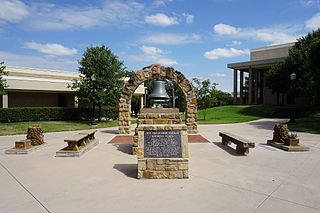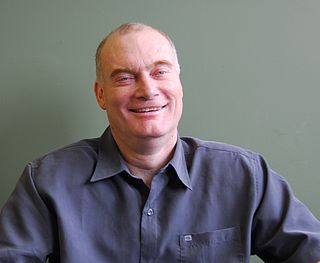Rehabilitation Engineering and Assistive Technology Society of North America (RESNA) is an association of people with an interest in technology and disability. Its mission statement notes that RESNA's mission is to improve the potential of people with disabilities to achieve their goals through the use of technology through promoting research, development, education, advocacy and provision of technology; and by supporting the assistive technology service providers engaged in these activities.
Rehabilitation engineering is the systematic application of engineering sciences to design, develop, adapt, test, evaluate, apply, and distribute technological solutions to problems confronted by individuals with disabilities. These individuals may have experienced a spinal cord injury, brain trauma, or any other debilitating injury or disease. Functional areas addressed through rehabilitation engineering may include mobility, communications, hearing, vision, and cognition, and activities associated with employment, independent living, education, and integration into the community. Improving web access is also a field of interest. Rehabilitation Engineering and Assistive Technology Society of North America, the association and certifying organization of professionals within the field of Rehabilitation Engineering and Assistive Technology, defines the role of a Rehabilitation Engineer as well as the role of a Rehabilitation Technician, Assistive Technologist, and Rehabiltiation Technologist in the 2017 approved White Paper available online on their website.

Assistive technology (AT) is assistive, adaptive, and rehabilitative devices for people with disabilities or the elderly population. People who have disabilities often have difficulty performing activities of daily living (ADLs) independently, or even with assistance. ADLs are self-care activities that include toileting, mobility (ambulation), eating, bathing, dressing, grooming, and personal device care. Assistive technology can ameliorate the effects of disabilities that limit the ability to perform ADLs. Assistive technology promotes greater independence by enabling people to perform tasks they were formerly unable to accomplish, or had great difficulty accomplishing, by providing enhancements to, or changing methods of interacting with, the technology needed to accomplish such tasks. For example, wheelchairs provide independent mobility for those who cannot walk, while assistive eating devices can enable people who cannot feed themselves to do so. Due to assistive technology, people with disabilities have an opportunity of a more positive and easygoing lifestyle, with an increase in "social participation," "security and control," and a greater chance to "reduce institutional costs without significantly increasing household expenses."

Technology is the sum of techniques, skills, methods, and processes used in the production of goods or services or in the accomplishment of objectives, such as scientific investigation. Technology can be the knowledge of techniques, processes, and the like, or it can be embedded in machines to allow for operation without detailed knowledge of their workings. Systems applying technology by taking an input, changing it according to the system's use, and then producing an outcome are referred to as technology systems or technological systems.
RESNA was started in August 1979. In 1993 RESNA became a self-managed organization. RESNA has over 1,000 members, the bulk of whom are concentrated in the US and Canada.
Beginning in 1995, RESNA developed certification programs for credentialing professionals working as assistive technology service providers. [1] [2] [3] [4] These certification programs are administered through RESNA's Professional Standards Board (PSB), which includes representatives from RESNA, the National Registry of Rehabilitation Technology Suppliers (NRRTS), and consumers. In December 2015, the Rehabilitation Engineering Assistive Technology Society of North America (RESNA) updated the WC18 standards for wheelchair tie-down and occupant restraint systems (WTORS)standards for wheelchair tie-down and occupant restraint systems (WTORS). [5] RESNA is governed by a 14-member Board of Directors. The president is Roger O. Smith, PhD, OT, FAOTA, RESNA Fellow
Professional certification, trade certification, or professional designation, often called simply certification or qualification, is a designation earned by a person to assure qualification to perform a job or task. Not all certifications that use post-nominal letters are an acknowledgement of educational achievement, or an agency appointed to safeguard the public interest.

Health care, health-care, or healthcare is the maintenance or improvement of health via the prevention, diagnosis, and treatment of disease, illness, injury, and other physical and mental impairments in people. Health care is delivered by health professionals in allied health fields. Physicians and physician associates are a part of these health professionals. Dentistry, midwifery, nursing, medicine, optometry, audiology, pharmacy, psychology, occupational therapy, physical therapy and other health professions are all part of health care. It includes work done in providing primary care, secondary care, and tertiary care, as well as in public health.

Accessibility in the sense considered here refers to the design of products, devices, services, or environments so as to be usable by people with disabilities. The concept of accessible design and practice of accessible development ensures both "direct access" and "indirect access" meaning compatibility with a person's assistive technology.
A disability robot is a robot designed to help people who have physical disabilities that impede with daily tasks. The field of expertise that creates such robots is called "disability robotics".

The University of Pittsburgh School of Health and Rehabilitation Sciences is an international leader in rehabilitation and disabilities education, research and community service. The School's faculty, students and alumni are dedicated to building a world free of barriers and disparities that allows all people, regardless of health, to have opportunities to participate in life to the fullest. Pitt SHRS includes some of the nation's top-ranked graduate programs including physical therapy, occupational therapy, speech-language pathology and audiology.
Clifford E. Brubaker is Dean of the School of Health and Rehabilitation Sciences at the University of Pittsburgh. Brubaker is also a Professor at that institution and an Adjunct Professor at both Xian Jiaotong University and Carnegie Mellon University.
Rehabilitation counseling is focused on helping people who have disabilities achieve their personal, career, and independent living goals through a counseling process.
Assistive technology service providers help individuals with disabilities acquire and use appropriate Assistive Technology (AT) to help them participate in activities of daily living, employment and education.
A legal nurse consultant is a registered nurse who uses expertise as a health care provider and specialized training to consult on medical-related legal cases. Legal nurse consultants assist attorneys in reading medical records and understanding medical terminology and healthcare issues to achieve the best results for their clients. The specialty is a relatively recent one, beginning in the mid-1980s.

Weatherford College is a college located in Weatherford, Parker County, Texas, with branch campuses in nearby Wise County, Granbury and Mineral Wells.
Founded in 1972, the International Wildlife Rehabilitation Council is a non-profit consortium of wildlife rehabilitators. IWRC began in California's Bay Area to share experiences and resources, and to "develop a professional organization through which North American rehabilitators could network and access information."

A standing wheelchair is assistive technology, similar to a standing frame, that allows a wheelchair user to raise the chair from a seated to a standing position. The standing wheelchair supports the person in a standing position and enables interaction with people and objects at eye level.
ISSA, the Worldwide Cleaning Industry Association is an international association of more than 9,000 companies in the professional cleaning industry. The mission of ISSA is “to be the leading resource for information, education, networking, and commercial opportunities as well as the leading voice in government and the community for firms within the worldwide cleaning industry.”
The Assistive Technology Industry Association (ATIA) is a not-for-profit membership organization of manufacturers, sellers and providers of technology-based assistive devices and/or services, for people with disabilities. ATIA represents the interests of its members to business, government, education, and the many agencies that serve people with disabilities. One goal of the ATIA is to "speak with the common voice" for Its mission is to serve as the collective voice of the Assistive Technology (AT) industry so that the best products and services are delivered to people with disabilities.

Dr. Gary Birch, is a Canadian Paralympian, an expert in Brain-Computer Interface (BCI) technology and Executive Director of the Neil Squire Society. In 1975, Dr. Birch was involved in an automobile accident which resulted in injuries to the C6 and C7 area of his spine making him a low-level quadriplegic. He was one of the original players of Murderball, and won several medals in the 1980 Summer Paralympics in the Netherlands. In 2008, he was appointed an Officer of the Order of Canada. He continues to champion accessibility through his Research and Development work in assistive technologies at the University of British Columbia, the Rick Hansen Institute, and the Neil Squire Society.
Driver rehabilitation is a type of rehabilitation that helps individuals facing challenges caused by a disability or age to achieve safe, independent driving or transportation options through education or information dissemination. Professionals who work in the field use adaptive equipment and modified vehicles to help people attain independent transportation.
The Commission on Rehabilitation Counselor Certification is a national certifying organization for professional rehabilitation counselors. Based in Schaumburg, IL, it is an independent, not-for-profit organization whose purpose is to establish, maintain, and monitor a national certification program for Certified Rehabilitation Counselors, including maintaining a register of all certified counselors and providing certification status for the public. The commission also maintains and updates a Code of Professional Ethics for Rehabilitation Counselors under which all certified rehabilitation counselors must practice. The certification program is accredited by the National Commission for Certifying Agencies, the accrediting organization of the Institute for Credentialing Excellence.

Rory A. Cooper is an American bioengineer who currently serves as FISA/PVA Distinguished Professor, Past Chair, in the Department of Rehabilitation Science and Technology and professor of Bioengineering, Physical Medicine and Rehabilitation, and Orthopedic Surgery at the University of Pittsburgh. He is also Associate Dean for Inclusion in the School of Health and Rehabilitation Sciences. He holds an Adjunct Faculty position at the Robotics Institute of Carnegie Mellon University, and is an Invited Professor at Xi'an Jiaotong University in Xi'an, China.








